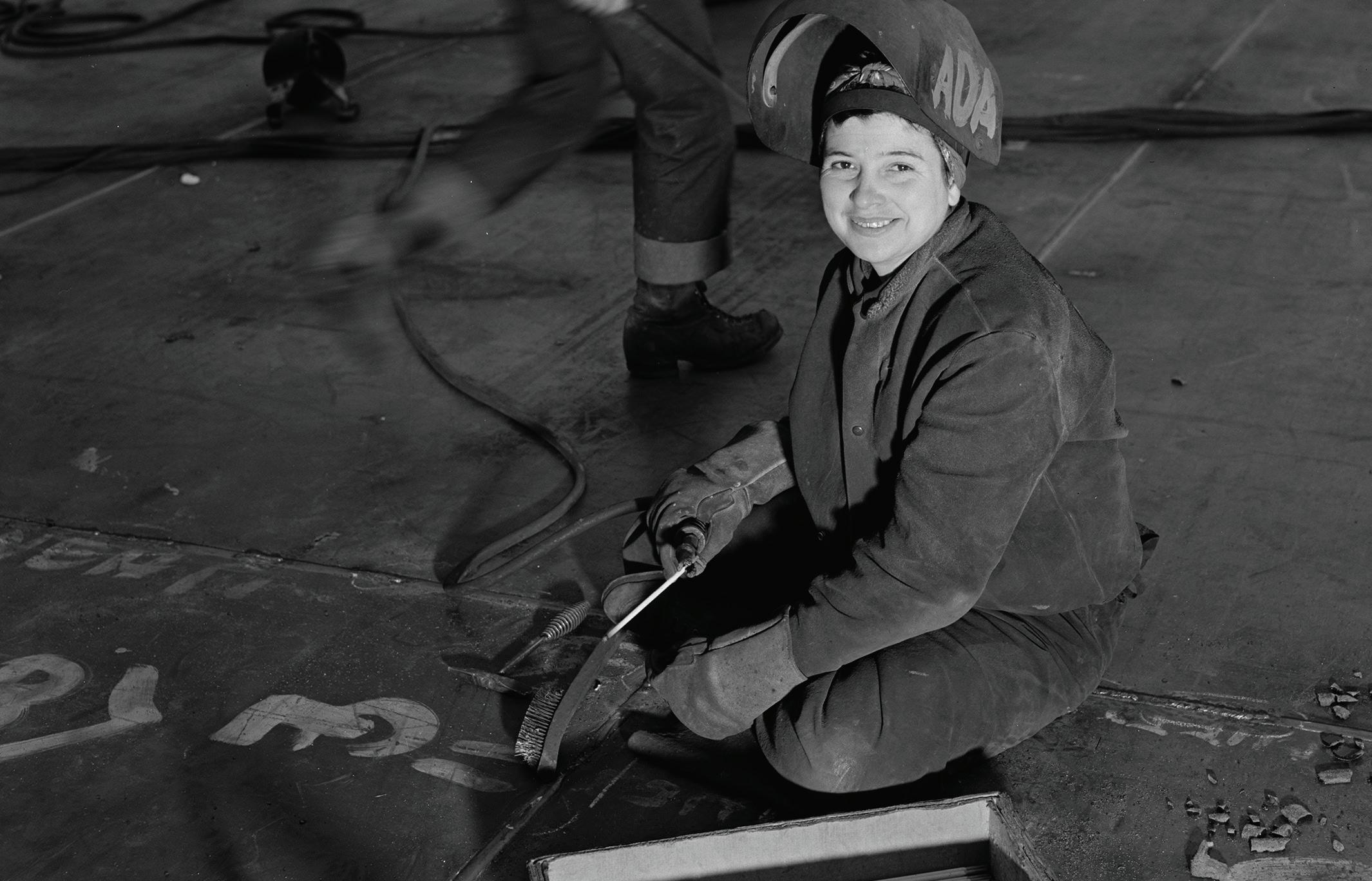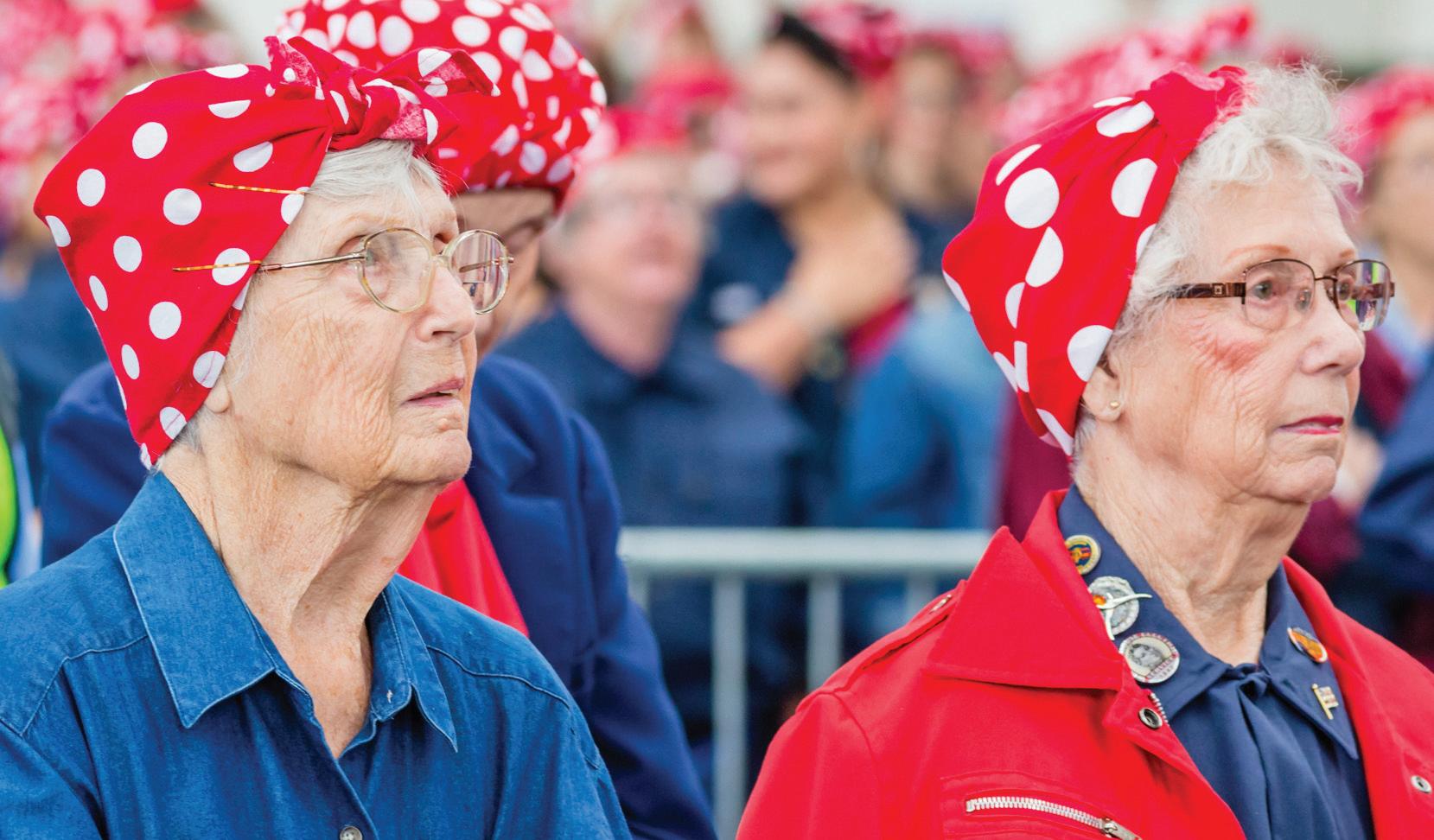
8 minute read
FEATURE
Good Gold As
REAL-LIFE ROSIE The contributions of the Rosies were slowly forgotten after the war, and they were never properly recognized.
Congressional Gold Medal honors real ‘Rosie the Riveters’
BY Janis Hashe
Phyllis Gould is now 99. But she was only 20, married and with a baby, when she went to work in the Kaiser Shipyards in Richmond as a welder, becoming one of an estimated six million American women who fulfilled vital roles in the effort to win World War II. Website history.com records that between 1940 and 1945, the percentage of women in the U.S. workforce increased from 27 percent to 37 percent.
Phyllis was not the only member of her family who became what came to be called a “Rosie the Riveter.” Her sister, Marian Sousa, now 94, moved down in 1942 from the family home in Oregon, first to help her sister with childcare, then, after completing a six-week course in engineering drawing at UC Berkeley, taking a job at the shipyards revising blueprints. She made $35 a week, “which was a good salary in those days,” she said. Eventually, Phyllis and Marian were joined by another sister and their mother, who also became Rosies.
Despite the acute need, their paths weren’t easy. “My husband was opposed to my working,” Phyllis said. But she attended welding class at Richmond High School anyway, and then traveled to Oakland to a hiring hall, where she was told she had to be a member of the Boilermakers Union. Male union officials refused to allow her to apply, until, one day, in tears at another refusal, she met a man who told her, “Go back and ask again.” She did, and was finally admitted to the union.
Even then, on the job, she was relegated to low-skill tasks, until she told her boss she could do a vertical weld—and did one. “He gave in at that point,” she said, and Phyllis began welding the three-story deckhouses, part of the “Victory Ships” being mass assembled in the shipyards. By the time the war was over, she was a Navycertified welder, “which is as high as you could go,” she said.
But, like almost all the women working in the war effort, both Phyllis and Marian went back to their homes after the war, raised families and never re-entered the workforce. Slowly, the contributions of the Rosies were forgotten—and they were never recognized as they should have been, both sisters agree.
Decades passed, until in the 1990s, Richmond City Council–member Donna Powers called attention to the number of former Rosies still living in the area, and pushed for the creation of a national monument honoring their service. “I wrote letters, starting with President Clinton,” said Phyllis. Just before leaving office, Clinton signed the certification for the Rosie the Riveter National Memorial and for other sites throughout Richmond. In 2000, the Rosie the Riveter/WWII Home Front National Historical Park was established in Richmond.
Yet, there was still more to do. Mae Krier, of Pennsylvania, who had worked building B-17s and B-29s during the war, joined forces with Phyllis to lobby for the creation of a national “Rosie the Riveter Day.” The idea did not gain traction, but another one, the striking of a Congressional Gold Medal honoring the Rosies, did.
Even that effort was a long struggle, said Tammy Brumley, who has acted as the park’s “Rosie Wrangler” since 2012.
“Phyllis writing and calling, Mae hitting the floors of Congress to petition. There’s nothing like meeting a real-life Rosie, handing you a red-andwhite polka-dot bandana she sewed herself and then being asked to sign onto the bill,” Brumley said.
Phyllis recalled writing reams of letters and feeling a little discouraged. Finally, she wrote one to then-Vice President Joe Biden, adding a P.S., “I want a big Biden hug.” She got that hug, as did several Rosies, including Marian and Mae, when they were invited to the White House. There, they met not only Biden, but President Obama, who revealed his grandmother had worked in the defense effort.
There was now support at the highest level for the awarding of a Congressional Gold Medal, including from Pennsylvania Sen. Bob Casey, and California Congressmember Jackie Speier. There was also general agreement that many women who served did not identify themselves as “Rosies” because they didn’t do riveting work or they weren’t white.
Brumley told a story of her husband’s 94-year-old aunt, who, when asked, “Weren’t you a Rosie?” replied, “No, I didn’t rivet—I painted bombs in a munitions factory in Arkansas.” Said Marian Sousa, “Black women thought they didn’t belong because they weren’t allowed to join the unions.” Phyllis related the true story of a 7th-grade girl whose essay on “Rosie the Riveter” as a female hero received an “F” because, »
All the day long, Whether rain or shine, She’s a part of the assembly line. She’s making history, Working for victory, Rosie—rrrrrrrrr— the Riveter.
— POPULAR SONG RECORDED BY KAY KYSER

Sisters Phyllis Gould and Marian Sousa.
«the teacher told her, “She isn’t real.”
Finally, in November 2020, both houses of Congress passed the bill authorizing the creation of a Congressional Gold Medal honoring the Rosies, which would be placed in the Smithsonian. President Trump signed the bill in December 2020. Rep. Speier asked Phyllis to contribute ideas for the design.
“I suggested it portray five female faces; white, Black, Asian, Latino and Native American, of different ages,” she said. “Everyone was included.” The medal is currently being designed.
From April 1–11, the Rosie the Riveter Trust, which supports the Rosie the Riveter/WWII Home Front National Historical Park, will toast the awarding of the Congressional Gold Medal of Honor with a virtual celebration. On April 11, virtual visitors can hear online from the “Rosie Ambassadors,” who, when the park reopens to visitors, will continue to greet and tell stories of the Home Front on Fridays. This will also pay tribute to dedicated Rosie Ambassador Agnes Moore, who passed away in January 2021, just short of her 101st birthday.
“We love seeing the school groups, the 4th graders who are learning about American history,” Marian said. “There’s great joy in speaking to people, and also hearing their stories.”
The event will also include “FundA-Need,” an online auction supporting the park and trust that is even more vital in a time of pandemic. Work has continued even during this time, with a 15-minute documentary about the Rosie Ambassadors currently in postproduction, according to park Marketing Director Lisa Foote. The film will show at the park’s visitor center when it reopens, and will also be available online.
Like the park’s exhibits, the documentary will not shy away from some of the “uncomfortable aspects” of the war effort. The park’s exhibits and films include information about the internment of Japanese Americans, and the oldest active ranger in the National Park Service, Betty Reid Soskin, has achieved national notice for her efforts to tell the story of Black women who served.
Proceeds from the auction, and another event planned for September, will support other park programs as well, including the Rosie Service Core, a summer program for girls, in which they learn about trades that could lead to career paths. “We are also partnering with the Boys’ and Girls’ Clubs of Contra Costa County,” Foote said.
She noted that there’s still time for people to interview family members who participated in the war effort, document their histories and gift them to the park. Photos are especially precious and will be preserved.
As for Phyllis Gould: She still has plans. She hasn’t given up on the idea of a national holiday honoring the Rosies—she would like it to be March 21, her mother’s birthday—and she wants to see plaques mounted on the Bay Trail next to the park, naming and saluting many more Rosies.
And truthfully, in the spirit of “We Can Do It!”—don’t bet against her.
For more information about the Rosie the Riveter/WWII Home Front National Historical Park, the Rosie the Riveter Trust and the upcoming events supporting them, visit rosietheriveter.org.
Get smart about your coverage! .015 478
5. 07 0

Ruth Stroup
oY ur oL cal aF r rem s gA tne
AC iL ec esn #0M13985,0F00956
35 06 G DNAR VA
E O ,DNALKA AC 9 64 01 RSTROUP@FARMERSAGENT.COM
YOU’RE BACK, BABY. ®
Brian M.
Endurance Athlete Family Man, Patient
thejoint.com
$29*
Berkeley
(510) 845-6468 2628 Telegraph Avenue Berkeley, CA 94704
We are open everyday from 10am to 2pm & from 3pm to 7pm.
Walk-Ins Welcome | Open Evenings & Weekends | No Insurance Needed
*Offer valued at $39. Valid for new patients only. Initial visit includes consultation, exam and adjustment. NC: IF YOU DECIDE TO PURCHASE ADDITIONAL TREATMENT, YOU HAVE THE LEGAL RIGHT TO CHANGE YOUR MIND WITHIN THREE DAYS AND RECEIVE A REFUND. (N.C. Gen. Stat. 90-154.1). FL: THE PATIENT AND ANY OTHER PERSON RESPONSIBLE FOR PAYMENT HAS THE RIGHT TO REFUSE TO PAY, CANCEL PAYMENT OR BE REIMBURSED FOR ANY OTHER SERVICE, EXAMINATION OR TREATMENT WHICH IS PERFORMED AS A RESULT OF AND WITHIN 72 HOURS OF RESPONDING TO THE ADVERTISEMENT FOR THE FREE, DISCOUNTED OR REDUCED FEE SERVICES, EXAMINATION OR TREATMENT. (FLA. STAT. 456.02). Subject to additional state statutes and regulations. See clinic for chiropractor(s)’ name and license info. Clinics managed and/or owned by franchisee or Prof. Corps. Restrictions may apply to Medicare eligible patients. Individual results may vary. © 2020 The Joint Corp. All Rights Reserved.

